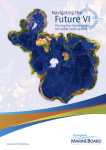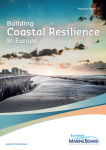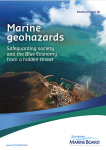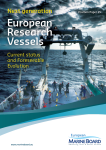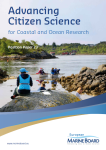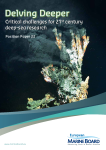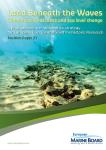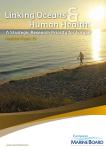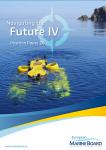Navigating the Future VI is a flagship foresight EMB Position Paper that explores the role of the Ocean in the wider Earth system and promotes collaboration between disciplines to tackle global issues. This document aims to influence and guide international, European and national research funding programmes, policy development and inspire the scientific community. This publication aligns with and provides input to important initiatives such as the UN Decade of Ocean Science for Sustainable Development and the EU Mission: Restore our Ocean and Waters, aiming to enhance awareness of the Ocean's critical role in addressing the climate, fresh water and biodiversity crises while supporting human health and wellbeing.
Position Papers
Considering that marine geohazards are unavoidable and will certainly continue to occur in the future, it is crucial to improve and expand our knowledge of those events. EMB Position Paper Nº26 presents an overview of the type, distribution and impact of marine geohazards on the European coastal regions and Blue Economy sectors. It highlights novel scientific approaches that broaden our understanding of their processes, trigger mechanisms and precursors. The document points towards relevant actions that would ensure the development of effective risk-mitigation and science-based management practices and policies, thereby contributing to protect coastal population and economic activities at sea.
EMB Position Paper 25 is a comprehensive look at the current research vessel fleet in Europe, updating the findings and recommendations of EMB Position Paper 10 from 2007 on “European Ocean Research Fleets - Towards a Common Strategy and Enhanced Use”. This publication is the result of a collaboration with the European Research Vessel Operators (ERVO) and presents an overview of the current fleet, its capabilities and equipment, and its management. It then looks to the future, highlighting what will be needed to ensure that the European fleet can continue to provide the same high level of support to science, in particular in specialized areas such as the deep-sea and Polar regions. It also goes beyond the fleet itself, to consider the training of fleet personnel, fleet management, and the role of research vessels in the wider context of ocean observations and the European Ocean Observing System (EOOS).
NFV provides governments with robust, independent scientific advice on future seas and ocean research from now until 2030 and beyond. The future we want requires a healthy ocean and the sustainable use of marine resources. However, the ocean is under threat from multiple interacting stressors. Moreover, we are still developing the scientific knowledge base and technology to fully explore, understand, observe and predict the ocean and the effect of human activities. NFV recommends a solutions-oriented, transdisciplinary marine research agenda, co-designed with all stakeholders and with the governance of sustainability at its core.
Position paper aims to provide new ideas and directions to stimulate further advancement of Marine Citizen Science.
This position paper identifies the key research needs and priorities to support the development of a holistic and coherent transnational oceans and human health research effort in Europe.
Foresight report organized around the framework of key societal challenges in the areas of climate, human health, food security, energy and safe and sustainable use of marine space.
